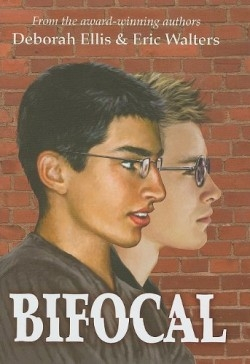Bifocal
- 2007 INDIES Winner
- Bronze, Young Adult Fiction (Children's)
Is it a longing for order, ethnic magnetism, or adolescent xenophobia that makes high school lunchrooms such showcases for segregation—or is that “niche societies? At Bifocal‘s Central Secondary, a high school in an unnamed Canadian metropolis, there’s a section for the kids from India, Pakistan, and the Middle East called Brown Town. There’s a place over by the doors, nearly outside, for the Goths and “emos,” who are “sort of diet-Goth.” The black kids sit in Cafrica near the Asian kids who dress like blacks and are called Jackie Chans. Of course, as anyone who went to high school knows, the jocks sit nearest the food and the pretty, popular girls sit where the jocks can see them.
The authors’ strategy for creating this book about bigotry and fear is ingenious: the text is written by two people, alternating the points of view of two different characters. Eric Walters, a social worker and coach with forty-six books to his name, writes from the perspective of a white athlete, Jay, a rising football star being groomed for the position of captain in his senior year. The book opens with Jay and other teammates climbing through a ceiling to get some perspective on a “lockdown” situation at the school. From their elevated position, they vocalize both wonder and contempt for the SWAT teams, bomb squads, and fleets of police that surround the school.
The other main character of the story, Haroon, has an entirely different take on the proceeding. It was in his classroom that the trouble began when police burst into his “Reach for the Top” rehearsal (an inter-school quiz competition) and cuffed him and the only other “brown” kid in the class, Azeem, for charges unknown. Deborah Ellis, the author of the Haroon segments, is a peace activist who has traveled the world to hear the stories of children marginalized by poverty and conflict.
Bouncing back and forth between white and brown, Muslim and everything else, right, wrong, high, low, and the “war zones” of football field, dinner table, and community, Ellis and Walters’ cooperation is both energetic and thoughtful. Bifocal will interest teens of all colors and backgrounds, and will make an excellent resource for teachers who wish to discuss controversial issues in their classrooms.
Reviewed by
Heather Shaw
Disclosure: This article is not an endorsement, but a review. The publisher of this book provided free copies of the book to have their book reviewed by a professional reviewer. No fee was paid by the publisher for this review. Foreword Reviews only recommends books that we love. Foreword Magazine, Inc. is disclosing this in accordance with the Federal Trade Commission’s 16 CFR, Part 255.

